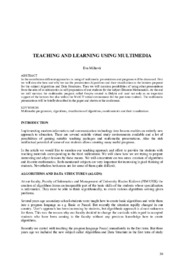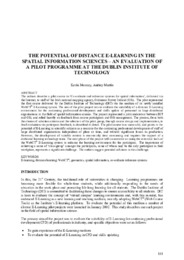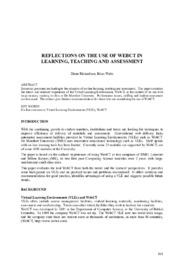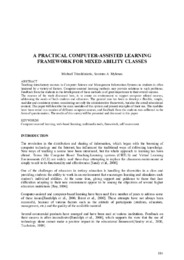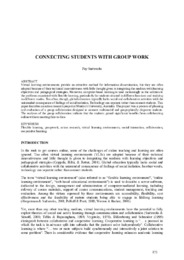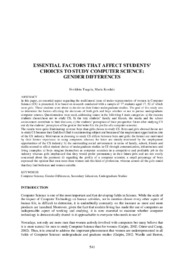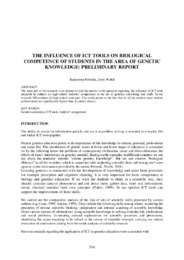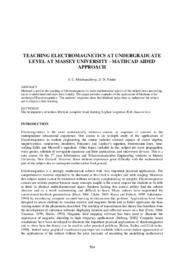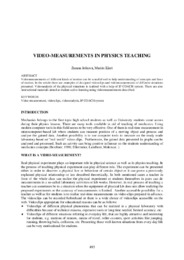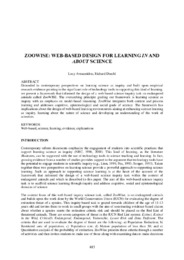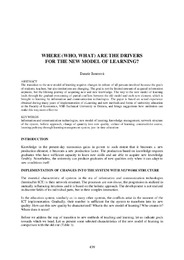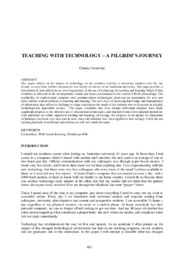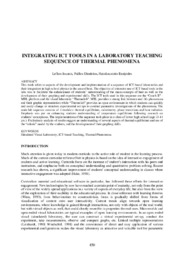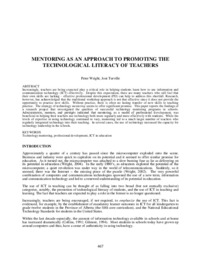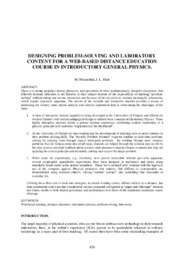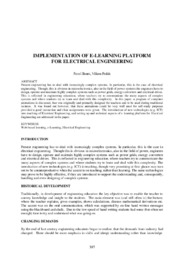Συνέδρια - Conferences: Recent submissions
Now showing items 201-220 of 502
-
Teaching and learning using multimedia
(Department of Educational Sciences, University of Cyprus, 2003)In the contribution different approaches to using of multimedia presentations and programs will be discussed. First we will describe how and why we use the presentation Algorithms and their visualisation in the lectures ... -
The potential of distance e-learning in the Spatial information sciences – an evaluation of a pilot programme at the dublin institute of Technology
(Department of Educational Sciences, University of Cyprus, 2003)The authors describe a pilot course in ‘Co-ordinate and reference systems for spatial information’, delivered via the Internet, to staff of the Irish national mapping agency, Ordnance Survey Ireland (OSi). The pilot ... -
Reflections on the use of webct in Learning, teaching and assessment
(Department of Educational Sciences, University of Cyprus, 2003)Economic pressures are leading to the adoption of on-line learning, teaching and assessment. This paper considers the tutors' and students' experience of the Virtual Learning Environment, WebCT, in the context of its use ... -
A practical computer-assisted learning framework for mixed ability classes
(Department of Educational Sciences, University of Cyprus, 2003)Teaching introductory courses in Computer Science and Management Information Systems to students is often hindered by a variety of factors. Computer-assisted learning methods may provide solutions to such problems. Feedback ... -
Connecting students with group work
(Department of Educational Sciences, University of Cyprus, 2003)Virtual learning environments provide an attractive method for information dissemination, but they are often adopted because of their technical innovativeness with little thought given to integrating the medium with learning ... -
Telecommunications technologies and Curriculum development: the case of a virtual High school project
(Department of Educational Sciences, University of Cyprus, 2003)In this paper we present the lessons we learned from developing online classes for a virtual high school (LUDAVHS) project and discuss the implications for teaching science using telecommunication technologies. Emphasis ... -
Essential factors that affect students’ choices to study computer science: gender differences
(University of Zilina, 2005)In this paper, an essential aspect regarding the multilateral issue of under-representation of women in Computer Science (CS) is presented. It is based on research conducted with a sample of 77 students aged 17, 52 of which ... -
An analysis of awareness of students in the utilization of technology
(University of Zilina, 2005)With the rapid advancements in technology, people are being more tied with the technological tools and materials that meet the requirements of the society. The increase of knowledge with support from technology augments ... -
The influence of ict tools on biological competence of students in the area of genetic knowledge: preliminary report
(University of Zilina, 2005)The main aim of the research is an attempt to find the answer to the question regarding the influence of ICT tools prepared by authors on high school students’ competence in the are of genetics knowledge and skills. In the ... -
Teaching electromagnetics at undergraduate level at massey university - mathcad aided approach
(University of Zilina, 2005)Mathcad is used in the teaching of Electromagnetics to make mathematical aspects of the subject more interesting, easier to understand and more user friendly. This paper presents examples of the application of Mathcad to ... -
Conceptual learning of selected physical topics through interactive multimedia
(University of Zilina, 2005)In the contribution there is the importance of selected physical phenomena regarding to the physical thinking of students presented. The results of pedagogical research show limited understanding of selected physical ... -
Video-measurements in physics teaching
(University of Zilina, 2005)Videomeasurements of different kinds of motion can be a useful tool to help understanding of concepts and laws of motion. In the article there are examples of designed videoclips and videomeasurements of different situations ... -
Zoowise: web-based design for learning in and about science
(University of Zilina, 2005)Grounded in contemporary perspectives on learning science as inquiry and built upon empirical research evidence pointing to the significant role of technology tools in supporting this kind of learning, we present a framework ... -
Webquest – activity for internet based learning
(University of Zilina, 2005)WebQuest is one of the effective methods of using ICT tools in the process of learning. It is an activity dedicated to making significant use of WWW resources. WebQuest idea derives from Bernie Dodgie, of San Diego State ... -
Where (who, what) are the drivers for the new model of learning?
(University of Zilina, 2005)The transition to the new model of learning requires changes in culture of all persons involved because the goals of students, teachers, but also institutions are changing. The goal is not the limited amount of acquired ... -
Teaching with technology – a pilgrim’s journey
(University of Zilina, 2005)This paper reflects on the impact of technology on the academic activity of university teachers over the last decade, as seen from within a department in a faculty of science of an Australian university. The paper provides ... -
Integrating ICT tools in a laboratory teaching sequence of thermal phenomena
(University of Zilina, 2005)This work refers to aspects of the development and implementation of a sequence of ICT based laboratories and their integration in high school physics in the area of heat. The objective of extensive use of ICT based tools ... -
Mentoring as an approach to promoting the technological literacy of teachers
(University of Zilina, 2005)Increasingly, teachers are being expected play a critical role in helping students learn how to use information and communication technology (ICT) effectively. Despite this expectation, there are many teachers who still ... -
Designing problem-solving and laboratory content for a web-based distance education course in introductory general physics
(University of Zilina, 2005)There is a strong prejudice among physicists, and specialists in other mathematically intensive disciplines, that effective distance education is not feasible in their subject because of the impossibility of teaching ... -
Implementation of e-learning platform for electrical engineering
(University of Zilina, 2005)Present engineering has to deal with increasingly complex systems. In particular, this is the case of electrical engineering. Though, this is obvious in microelectronics, also in the field of power systems the engineers ...
